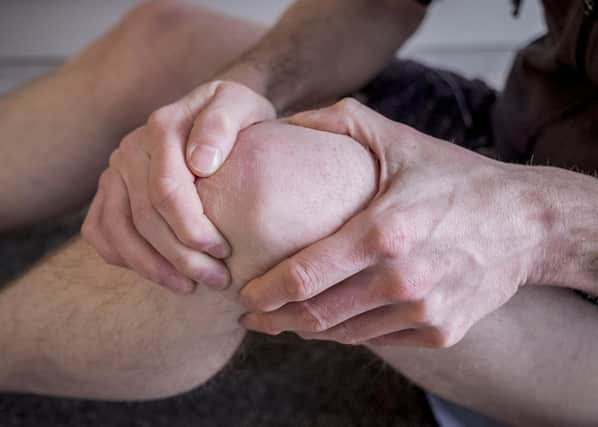FEELING GREAT: Be kind to your knees, you'll miss ‘em when they're gone!


If not, give it time. Because, as you no doubt know, “clicking”, “clunking” and “cracking” are common, audible sounds that come as an inevitable consequence of growing older - and they become more noticeable somewhere in the 50-60 age bracket.
Chances are that if you’re 50 or over, clicks and clunks might even be the first sound that you hear when you get out of bed in the morning. It happens to lots of people, and what’s just as common is a grating noise, which occurs when the surfaces of your knee joints rub together each time you bend your legs (or move between positions).
Advertisement
Hide AdAdvertisement
Hide AdI could go on and on describing the different noises that come from ageing knee joints - it’s so common that the question “Why does my knee click and crack?” is one of the most frequent I get asked.
And happens because your knee takes a pounding from the hard surfaces you walk on, regardless of what else you do. Add this to the pounding your knees take as a direct result of playing a game of five-a-side football after work in a sports hall, running along the beach, playing bowls, golf, or just taking a long walk around then the upshot of all this is that, over time, the cartilage in your knee wears thin (or disappears completely), exposing nerves and causing pain but also leaving uneven surfaces that can collide.
And because these bones in your knee joint are very tough and hard (as you might well expect), inevitably they cause a distinct noise when they rub against each other as you move your leg in and out of different positions.
And that’s it, nothing more to it. The phenomenon of knee joint noises explained in a couple of paragraphs!
Advertisement
Hide AdAdvertisement
Hide AdWhat’s interesting is that the presence of the noises doesn’t always mean you’ll get knee pain - not at first anyway. But it’s often the first sign that trouble in the form of pain, stiffness and swelling is on the way and you’re not too many years away from it. If you like, it’s a warning sign to act fast and do something before things turn for the worse.
So what do you do about it?
Some people opt for knee supports, which might help (but only for a short while), but my tip is to “Strengthen” your knees by doing some very gentle exercises (not, exercising) – something like twice per day which will improve control of the muscles around the knee – that and wear cushioned shoes.
Want some more tips? If so, be sure to go to this website now: www.paulgoughphysio.com/knee-pain to collect a free, consumer awareness report entitled: “How To Stop Knee Pain Without Taking Painkillers” where I reveal 7 more secrets for being more active and living with less knee pain. It’s currently free to Mail readers.
P.S. If knee pain is getting you down and you’d like to find out exactly why and what you can do about it, on Saturday March 7, we’re holding our popular Knee Pain Event at our Hartlepool clinic. It’s completely FREE for you and a family member or friend to attend, and you’ll have the opportunity to ask our knee pain experts any questions you have. Space is limited and just two seats remain. To book your seat and find out more give the team a call on: 01429 866 771 – and we’ll help you put an end to knee pain for good.